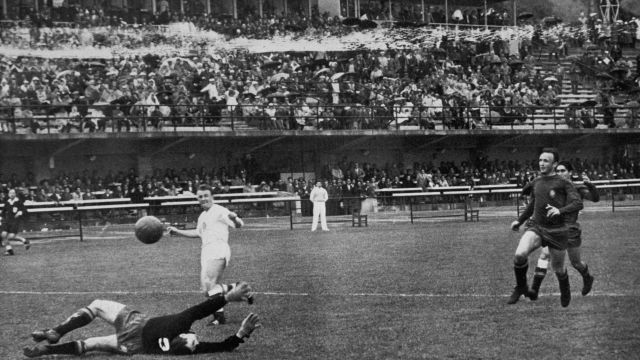Spanish club football ruled the world at the time, Real Madrid won the first five years of the new European Champions Cup (1956–1960), Barcelona lost in the Benfice Lisbon final in 1961, Atlético Madrid won the Winners’ Cup in 1962, and Valencia won the Trade Fair .
–
That’s why the Spaniards left for the World Cup in Chile and confidently wanted to win the title. It is exactly 60 years since the Czechoslovak team beat Spain 1-0 in the introduction to such a famous tournament. The only goal in Viña del Mar was scored by the Trnava teacher Jozef Štibrányi, nicknamed Vasil.
–
Seven Barcelona players
Spain was ruled by the rigid dictatorship of General Francis Frank, which isolated him from all inappropriate stimuli from abroad after the Civil War. However, the hardest period of isolation (1945–1953) had already been averted, and Spain was opening up to the world, no doubt on the football field. No other sport can promote the regime as much as football. Club-level successes have already accumulated, now it’s time for the national team.
–
This was led by the Argentine magician Helenio Herrera and he had a free hand in his choice. He could also summon Barcelona players, because it was no secret that Franco hated the Catalans for their patriotic attitudes and constant separatist tendencies.
–
There were seven Barcelona players in the selection – goalkeeper Sadurni, defenders Segarra (he was even the captain), Rodri and Gracia, midfielder Garay, attackers Martínez and Vergés. There were also Basques and Galician people, the national question was suppressed after years. Herrera’s coach could also call in legionnaires, the staff was decorated by the famous Luis Suárez, holder of the Golden Ball for the best footballer in Europe in 1960, who worked at Inter Milan in Italy.
–
Naturalized foreigners
However, the profession of the best footballers with Spanish roots has not yet guaranteed success. The staff was also strengthened by foreigners who acquired citizenship in Spain and could, according to the rules of the time, also represent their new homeland – this possibility fell at the FIFA Congress in June 1962 in Santiago de Chile.
–
The biggest catch was undoubtedly the blonde arrow Alfredo di Stéfano, Golden Ball 1957 and 1959, a native of Buenos Aires. After enrolling in the Argentine and Colombian national teams, he was also going to decorate the Spanish team.
–
Another great figure from Real Madrid was the “suffocating major” Ferenc Puskás, the biggest star of the legendary Hungarian team, world vice-champions 1954. After the Soviet army suppressed the attempt to end communist terror in 1956, like many other Hungarian footballers (Czibor, Kocsis, Hidegkuti) he went abroad, where he settled and gained new citizenship.
–
The center of defense was sealed by a well-built stuntman José Santamaría, who was born in Uruguay and lost the gold from the 1950 World Cup in Brazil only because his club Nacional Montevideo did not release him. He left for Europe and began representing Spain in 1957.
–
The modest Czechoslovaks, whom their fans advised not to unpack their suitcases before leaving the ocean, should not have been the slightest obstacle for this stellar team.
–
Di Stéfano in the stands
But on the last day of May at the Estadio Sausalito in the seaside resort of Viña del Mar on the Pacific coast, everything went quite differently than coach Herrera had planned.
–
It was lightly rained, that suits me great, such a mud. The ball fell in front of us and jumped over us. At that moment, I made a turn and started. By the time they responded, I was five feet away. They didn’t stand a chance, I was quick.
–
Di Stéfano was not ready to start due to health problems, he only watched the match in the stands. The first big loss. The 35-year-old Puskás had had his best years, his left hand was still magnificent, but he would have to get to using it first.
–
And most importantly – the Czechoslovak team was well prepared for a famous opponent, a great psychologist and strategist, coach Rudolf Vytlačil, explained to his charges that the famous names do not have to be afraid that they are as good as they are. Second-league right-back Jan Lála (then Slavia under the communist name Dynamo Prague played in a lower competition) erased the greatest danger of the Spanish ensemble, wing forward Francisco Gent.
–
Life shot
And then it came. Ten minutes before the end, a goal fell, but into the net of a big favorite. “The Spaniards dug the corner and I was standing in the middle of the circle,” recalls his life goal. “I was the only one left alone, looking at our gate. Next to Reij, on the other side Santamaría. They couldn’t leave me alone, but that Santamaria was also there, I was surprised, he was tall, that he didn’t go around the corner, “he describes the initial situation. “I don’t know who kicked it, but suddenly there was a counterattack,” he recalls as the situation progressed.
–
Very promising for the Czechoslovak team. “It was lightly rained, that suits me very well, such a mud,” Štibrányi remembers of the conditions. “The ball fell in front of us and jumped over us. At that moment, I made a turn and started. Before they reacted, I was five meters away, they didn’t stand a chance, I was fast, “he emphasizes his advantage.
–
League of Nations program
- It is played on Sunday, June 12 at 8:45 p.m.
- Stadion La Rosaleda (Malaga).
——
He advanced to the opponent’s goal. “I led the ball in a 50-meter sprint and I had to kick it. When the goalkeeper, a two-meter giant, ran almost sixteen, I kicked him and he thought I was already shooting, so he returned to the penalty mark, “he recalls how goalkeeper Carmelo Cedrún behaved. “Then when I fired. It went into the goal quite slowly, I was still running to the goal and I went around it and then Jelen (Josef Jelínek) ran, kicked it into the goal again, “concludes his shot.
–
It was not a coincidence or an immediate invention. “Imagine that we played in Sparta before leaving, we won 4: 1 and I scored two goals after such leaks,” said the Spartak Trnava striker.
–
The Czechoslovak team then won only for silver medals, when in the final they defended the defending champion Brazil 1: 3.
–
The face of Meciar’s campaign
It was the most famous goal in Štibrányi’s career. A year later, he enlisted in Dukla Prague for full-time military basic service, but he did not succeed in a strong army and dropped out of the national team. He closed his account at nine starts and one goal – against Spain at the 1962 championship in Chile.
–
By profession a teacher, a silver medalist, after the social changes in 1989, he took a political path and became – due to the famous goal at the South American Championship – very attractive – the campaign of Vladimir Meciar, which contributed a lot to the disintegration of the federation. “There’s nothing to boast about,” he realizes, his reputation has been abused.
–
At eighty-two, he is still nimble and very vital. He will never forget a goal sixty years ago in the network of the stellar Spanish team, he describes it until he was tired. But he didn’t get tired.
—


